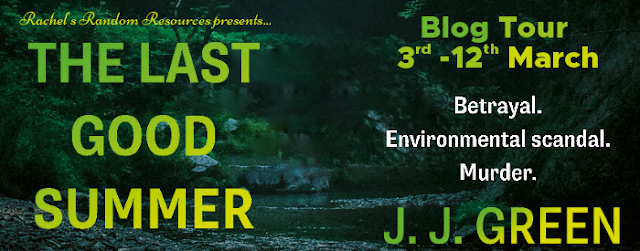"That summer," Maeveen said, "was the happiest of times. Innocent times, the last of the innocent times". She looked down at her glass. "When we were young with not a care in the world"... "But they're all gone now," she went on. "Fionn. And Mammy. And Daddy. We're the only ones who remember that summer, Belle".
The Last Good Summer by J.J. Green is a psychological suspence novel, with the themes of corruption at the heart of politics and the environmental devastation.
This gripping dualtime novel is set in Ireland at present, and going back to 1986. The chapters alternate in time, as the story unfolds.
Blurb:
In the summer of 1986, Belle McGee is thirteen. The arrival of Fionn Power at her family home sets in motion a tragic chain of events.
Now a forty-something investigative journalist living in Dublin, Belle returns home one night to find Fionn standing in the hallway before inexplicably vanishing. Unsettled, Belle immediately phones her sister, who tells her that Fionn was found dead that very morning.
In her journey to find answers, Belle exposes corruption and scandal and is forced to stop running from the shameful truth of 1986.
Belle McGee is a successful investigative journalist, a winner at the National Journalism Awards. Belle loves her job, she is single, in an on/off relationship with a colleague. After an evening of drinks at the bar with her co-workers, Belle arrives late to her house, and in a patch of silver light in the shadows sees a shape of someone she has tried not to think of for many years. The figure from her past, Fionn meant the world to her. Belle tries to convince herself that she hasn't actually seen him.
Her sister Maeveen has been trying to talk to her all day, and when Belle finally calls back, it is to find out the distressing news. Fionn is dead. Murdered that morning.
Belle goes back to Donegal, looking for some answers. She arrives to her family home, where her older sister lives now. "She drove through to the cobbled courtyard at the back of the house and her childhood years exploded in her mind like fireworks. The past was in front of her eyes, as real and present as the here and now".
Going back home brings back a lot of painful memories, especially of that not so distant summer of 1986.
"In 1986, a family had lived in this house: Mr and Mrs McGee and their two daughters. And Fionn, too, for a while. Had that been the last happy time, the last truly happy time? That was the tragedy about life. You never knew when you were living your happiest time; you never knew to savour it and make the most of it".
How does one exist, carrying a great burden for the past wrongdoing?!
"Fionn was gone, forever, and she'd missed her chance to put things right. All these years, she'd chosen to say nothing and instead just carry the guilt around like some putrefying corpse that she kept hidden out of sight. Now, it was too late."
Digging for answers about Fionn's murder, Belle comes across the hidden cache of the documents that he kept: ordnance survey maps, lists of names and placenames. Could his research be linked to the murder? The deeper Belle digs, the more dangerous her investigation becomes.
She realises that big players must be involved, high up officials, councillors. "We could be talking about a multi-million pound racket here... There's a lot at stake here..." It's not safe to continue the investigation.
In order to uncover the outrageous scandal of the present, Belle has to accept the painful truth of her past.
The comparisons with Atonement are inevitable, with the themes of constant guilt and attempts to atone for the past deeds running through.
The main character is a complicated personality, who is not easy to relate to. Their inner self-punishment does not atone for the hurt caused. My younger son is nearly the same age now, as the main protagonist during that tragic summer. Surely at that age one can foresee that the consequaneces of their actions would bring a disaster. While not mature enough to grasp the enormity of the possible outcome, it's hard to understand how a person of thirteen could be so disloyal to the family and unaware of the political undercurrents, especially in Ireland of that period.
Growing up under the undemocratic regime, I remember there were things we discussed at home that as children we just knew not to repeat anywhere else. You just recognised the consequences would be dire.
The story is not exactly a love triangle, more of a disturbing confusion of feelings and emotions. The ending is predictable but still giving you a kind of an emotional shock. You know what's going to be revealed, yet hoping against hope that you're wrong.
The Last Good Summer is a thought-provoking read, full of drama and unexpected twists, strong on atmosphere. An absorbing tale of loss, grief, guilt, and redemption, the narrative flits between the present day and the past, weaving together a compelling yarn. Memorable and poignant.
This review is part of the blog tour for The Last Good Summer.
Many thanks to J.J.Green, The Book Guild Ltd and Rachel's Random Resources for my copy of the book!
Purchase Links
UK - https://www.amazon.co.uk/Last-Good-Summer-J-Green/dp/1915352711/
US - https://www.amazon.com/Last-Good-Summer-J-Green/dp/1915352711/
Author Bio –
J. J. Green is an Irish writer who hails from Donegal and lives in Derry. She’s had a passion for writing fiction from childhood and has honed her creative writing skills throughout her adult life. As a social and environmental activist, she also writes non-fiction in the form of political essays that mainly focus on economic and environmental injustice. The Last Good Summer is her debut novel.



No comments:
Post a Comment